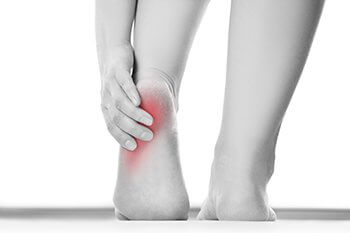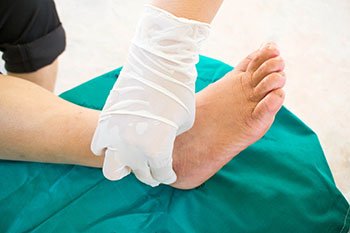
Freehold (732) 294-9393

Freehold (732) 294-9393

Located in Freehold, NJ, podiatrist Dr. Henry J. Miller strives to supply patients with quality treatment and care of the foot, ankle, and lower leg. Dr. Miller has served the Monmouth County area since 1993, providing treatment for a variety of podiatric conditions including bunions, corns, calluses, heel pain, and ingrown toenails. He is certified by the American Board of Foot and Ankle Surgery. Also certified by the Council for Medical Education and Testing (CMET) in wound healing, Dr. Miller specializes in diabetic foot care and wound care. The office’s friendly staff welcomes new patients of all ages, promising to deliver a pleasant office visit. The practice aims to work with patients to ensure that they fully understand their conditions and the treatments that best suit them.
Dr. Henry J. Miller accepts a variety of insurance plans. Call (732) 294-9393 to schedule an appointment today!
Dr. Miller is available to treat foot and ankle ailments such as diabetic foot care, ingrown toenails, fungal toenails, warts and painful calluses. Our practice specializes in general foot care. Please call (732) 294-9393 for an appointment.

Ankle Sprains
Ankle sprains are caused by an unnatural twisting or force on the ankle bones of the foot, often resulting in one or more ligaments on the outside of the ankle to be stretched or torn. If not properly treated, ankle sprains could develop into long-term problems.
Bunions
Bunions are misaligned big toe joints that can become swollen and tender, causing the first joint of the big toe to slant outward, and the second joint to angle toward the other toes.
Flat Feet
Flat feet are a common condition. In infants and toddlers, the longitudinal arch is not developed and flat feet are normal. The arch develops in childhood, and by adulthood, most people have developed normal arches.
Hammertoes
Hammertoe is a deformity of the second, third or fourth toes. In this condition, the toe is bent at the middle joint, resembling a hammer. Left untreated, hammertoes can become inflexible and require surgery.
Diabetes and Your Feet
With a diabetic foot, a wound as small as a blister from wearing a shoe that's too tight can cause a lot of damage. Diabetes decreases blood flow, so injuries are slow to heal.
Heel Spurs
Plantar fasciitis (or heel pain) is commonly traced to an inflammation on the bottom of the foot. Our practice can evaluate arch pain, and may prescribe customized shoe inserts called orthoses to help alleviate the pain.
Corns
Corns and calluses are protective layers of compacted, dead skin cells. They are caused by repeated friction from skin rubbing against bony areas or against an irregularity in a shoe. Corns ordinarily form on the toes and calluses on the soles of the feet.
Athlete's Foot
A chronic infection caused by various types of fungus, Athlete's foot is often spread in places where people go barefoot such as public showers or swimming pools.

Heel pain is most commonly caused by repetitive stress. With that being said, it may be more common for athletes who perform repetitive movements to be afflicted with heel pain at some point during their activity. Heel pain can occur due to a number of different factors. These may include issues with having poor circulation, complications due to arthritis and diabetes, and poor form when running or exercising, as well as having poor posture.
There are a number of conditions that may also influence pain felt in the heel region. Tarsal tunnel syndrome is one example of a condition that affects the heel. This may occur when the nerve in the back of the foot becomes pinched, thus causing a numbing or tingling feeling as if the heel has pins and needles in them. Heel bursitis is another condition that commonly brings discomfort to the heel. This condition may arise when inflammation occurs at the back of the heel, often occurring due to landing awkwardly or wearing footwear that puts a good amount of pressure on the heel. As a result, the Achilles tendon may swell, causing the pain to increase throughout the day. Simple exercises focused on strengthening the heel and surrounding areas, as well as focused on building the flexibility of the foot, may help to prevent and treat heel pain.
For a proper diagnosis and advised professional treatment plan, we recommend that you consult with a podiatrist as soon as possible to avoid developing a serious condition.

Foot and ankle surgery may be performed depending on the severity of the injury. In any case, if you happen to develop a foot condition, it’s always advised you seek the counsel of a podiatrist for a proper diagnosis and advised treatment plan. If you notice an abnormal growth, a change in the appearance of your foot or ankle, discomfort while standing or walking, or general foot pain, it would be in your best interest to seek professional help, especially if surgery is the recommended treatment for your case.
Podiatrists perform foot and ankle surgery to treat a number of different conditions. These may include bunions, heel pain, flat feet, arthritis of the foot or ankle, sports injuries, hammertoes, ingrown toenails, complications due to diabetes, and fractures, to name a few. Again, the need for surgery is dependent upon the type of injury you are experiencing, as well as its severity. This also means that the recovery process for surgery will vary as well. With that being said, most podiatrists will recommend you get plenty of rest, stay off your feet, ice the affected area to reduce swelling, and elevate the affected area.
If you believe you have a foot or ankle injury that may require surgery, it’s highly recommended that you speak with a podiatrist as soon as possible to go over the best treatment option for your condition.

For those with diabetes, early prevention and prompt treatment for wounds can be crucial to maintaining healthy feet. Unfortunately for those with diabetes, minor wounds have the ability to turn into serious ulcers if left uncared for. Simply walking in new or tight-fitting shoes can be enough to form a serious foot condition. Diabetes affects the nerves of the feet, sometimes leaving them with little or no feeling. If a wound therefore develops and isn’t felt, it may be hard for that person to recognize they need care.
To avoid ignoring wounds and to help prevent the development of serious foot conditions, it’s advised to check your feet daily for any abnormalities. It can also be beneficial to wear comfortable shoes with extra support. Avoiding high heels and other tight-fitting shoes may help in preventing certain foot complications. You should also be careful in how you trim your toenails. Avoid cutting at an angle and digging into the sides of skin surrounding the nail. Lastly, be sure to wash and dry your feet thoroughly to maintain proper hygiene for your feet.
For information on wound care and wound prevention, we recommend you speak with a podiatrist for professional care and advice.
1000 West Main Street
Freehold, NJ 07728
(732) 294-9393
| Mon: | 9:00 am - 12:00 pm |
| Tues: | 2:00 pm - 6:00 pm |
| Wed: | 9:00 am - 12:00 pm |
| Thur: | 2:00 pm - 6:00 pm |
| Fri: | 9:00 am - 12:00 pm |
| Sat: | By Appointment Only |